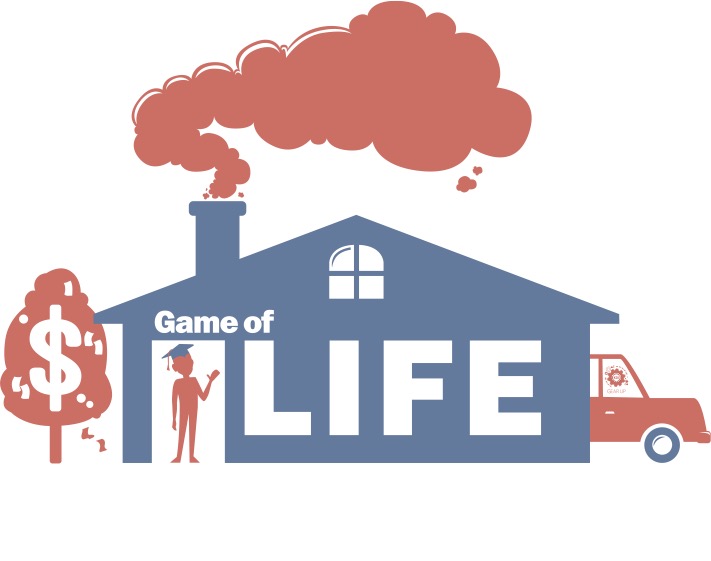Summary
Give students a taste of life beyond high school in this real-world "Game to Prepare for Life" based on the popular board game. Students will get a career, salary, and family to provide for. Along the way, they will encounter expenses like housing, health, cars, and insurance. They will juggle their wants and needs to ensure they do not exceed their monthly budget. By the end of the game, they will have learned how career choices can impact a person's lifestyle and bank account.
Essential Questions
How do the choices we make after high school impact the kind of life we lead?
What do I want my career path to look like?
Materials List
Event Setup (attached; 1 copy for organizers)
Booth Materials (attached; 1 copy with handouts to give to volunteers)
Career Ledger (College) (attached; 1 copy; on red paper)
Career Ledger (Community) (attached; 1 copy; on blue paper)
Career Ledger (CareerTech) (attached; 1 copy; on green paper)
Career Ledger (Military) (attached; 1 copy; on yellow paper)
Career Ledger (Degree Optional) (attached; 1 copy; on purple paper)
Career Ledger Template (attached)
Chance Cards (attached; 1 copy; on card stock)
Four Corners (attached; 1 copy to display)
Student devices
Calculators for each booth
Pencils
Booth decorations (optional)
Learning Goal
Evaluate education and career goals for the impact they have on the quality of our lives.
Engage
15 Minute(s)
Place students in pairs or have them work individually. Every student or pairs of students will need access to a computer with internet access. Have students log in to the Game Portal to play the “Get a Life” game.
Encourage the students to explore the game and pay close attention to the relationships between education, income, debt, and career choice. After playing, ask students what differences they noticed with different careers, education levels, and finances. Ask students what careers they would want if they could pick for themselves and why. Ask students if they have ever played the board game “Life” and what they remember about it.
Explain to students that they are going to get the chance to live out some choices on their own as they play the “Game to Prepare for Life.”
Preview what the expectations will be for this real-life game where they are the pieces moving around a life-sized board.
Explore
30 Minute(s)
Once students have checked in and picked up their career ledger, they are able to navigate to each booth as they choose. They have to visit every booth and have a volunteer initial that they visited before their game is complete. At each booth, students will have decisions to make and expenses to record in their ledgers. They will use the calculators at each booth to keep a running total of their balance. Booths include car, home, furniture, child care, health clinic, entertainment, and many more.
See the Booth Materials attachment for details on what the choices are at each booth, a detailed instruction page for each volunteer, and student-facing materials to aid them as they make life decisions.
Explain
30 Minute(s)
As students travel from booth to booth, they may notice that expenses add up quickly. All booth volunteers have instructions to help students who return to their booths to adjust their budget. Students may decide they want a less expensive car, or to be thriftier in their purchase of groceries or furniture. This is why it is important students have access to pencils rather than pens for this game. They will be making adjustments. For students who can’t get by just by making more frugal choices, they can visit the supplemental income booth to see if they would want to take on a second job.
Extend
30 Minute(s)
As students finish the game, have a designated spot for them to gather and reflect. This can be a great time to record exit interviews asking students on video what they enjoyed, what they learned, what they would have changed, and what surprised them. Rather than recording, these questions could also be placed on cards and given to groups of 5-6 students to sit together and discuss while they wait on others to finish the game.
Evaluate
15 Minute(s)
To follow up with students the day after the event, have students participate in a Four Corners activity. Post one of the Four Corners cards in each corner of the room. Provide students with the following prompts and let them move to where they "Strongly Agree," "Agree," "Disagree," and "Strongly Disagree." You can choose to use all or some of the following prompts:
Going to college is important to have the lifestyle you want.
I had plenty of money to cover my expenses.
I was surprised by how much a house costs.
I was able to afford the unexpected expenses from the chance cards.
I was surprised by the extra things like tag and insurance you have to buy to have a car.
I expected there would be lots of bills to pay.
I was surprised by the amount of child care costs.
I feel like I have a better understanding of budgeting after this activity.
Follow-Up Activities
30 Minute(s)
Following the event, have students reflect on the career experiences they have had both with the “Game to Prepare for Life” and “Get a Life.” Ask them to consider how have their experiences influenced their thoughts about college and career. Give students a blank piece of paper and give them time to decorate and doodle their personal Vision Board for what they want to happen in their own lives. They will give students time to share out or chat in pairs about what they decided to include.
Research Rationale
College can be a life-altering experience for students, and not only academically. Here are just a few of the ways in which college can change students' lives for the better: Earning a bachelor's degree will allow students to earn, on average, $1 million more than high school graduates over the course of their careers (Abel & Deitz, 2014). College offers students an opportunity to build relationships with mentors and peers that will benefit them throughout their careers (Campbell, Smith, Dugan, & Komives, 2012). College graduates tend to have more job satisfaction, jobs that offer a greater sense of accomplishment, more independence and opportunities for creativity, and more social interactions in their jobs than noncollege graduates (Oreopoulos & Petronijevic, 2013). College graduates increase their chances of employment. Over the last 20 years, the unemployment rate for college graduates has been approximately half that of high school graduates (Bureau of Labor Statistics, 2018). College helps students develop skills that prepare them for careers in the tech-driven economy, including nonroutine, abstract skills that aid in problem-solving, multitasking, and creativity (Oreopoulos & Petronijevic, 2013).
Resources
Abel, J. R., & Deitz, R. (2014). Do the benefits of college still outweigh the costs? Current Issues in Economics and Finance, 20(3
). https://www.newyorkfed.org/medialibrary/media/research/current_issues/ci20-3.pdf
Bureau of Labor Statistics. (2018). Labor force statistics from the current population survey. https://www.bls.gov/cps/cpsaat07.htm
Campbell, C. M., Smith, M., Dugan, J. P., & Komives, S. R. (2012). Mentors and college student leadership outcomes: The importance of position and process. The Review of Higher Education, 35(4), 595–625. https://muse.jhu.edu/article/478995
K20 Center. (n.d.). Four Corners. Strategies. https://learn.k20center.ou.edu/strategy/138
K20 Center. (n.d.). Vision Boards. Strategies. https://learn.k20center.ou.edu/strategy/2054
Oreopoulos, P. & Petronijevic, U. (2013). Making college worth it: A review of the returns to higher education. The Future of Children, 23(1), 41–65. https://pubmed.ncbi.nlm.nih.gov/25522645/



